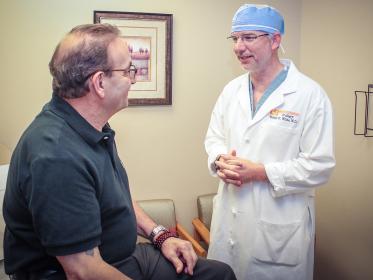Overview
Prostate cancer is a malignant tumor that originates in the prostate gland. As with any cancer, if it is advanced or left untreated in early stages, it may eventually spread through the blood and lymph fluid to other organs. Fortunately, prostate cancer tends to be slow growing compared to other cancers. As many as 90 percent of all prostate cancers remain dormant and clinically unimportant for decades. Most older men eventually develop at least microscopic evidence of prostate cancer, but it often grows so slowly that many men with prostate cancer “die with it, rather than from it.”
The Cancer Institute’s Prostate Service offers patients in Knoxville and East Tennessee state-of-the-art diagnosis and treatment of genitourinary cancers. The urologic oncologists at the Cancer Institute have years of experience in treating both urologic and male genital malignancies. These surgeons received their training from a variety of excellent medical centers, including Memorial Sloan Kettering Hospital, Vanderbilt University and Duke Medical Center. The Cancer Institute’s urologic specialists have been leaders in providing new, highly advanced procedures to the East Tennessee Region.
Prostate Cancer Screening
An appointment for prostate screening can be made anytime with the UT Medical Center’s team of urologists. Prostate screening consists of a digital rectal exam and a prostatic specific antigen (PSA) blood level for men between the ages of 50 -70. Men younger than 50 with risk factors, including family history, should discuss screening with their physician. Men over the age of 70 who are otherwise in good health should also consider discussing the benefits of screening with their physician.
Prostate Seed Implant Program
The Cancer Institute was the first cancer program in the region to offer prostate brachytherapy (seed implant) treatment for prostate cancer. The urologists and radiation oncologists collaborate to make this significant and effective treatment alternative available to prostate cancer patients. These specialists have performed more than 700 prostate seed implants with very positive outcomes.
Brachytherapy is the implantation of radioactive seeds into the prostate gland. These seeds provide a specific dose of radiation prescribed by the physician directly to the cancer cells while decreasing the risk of radiating surrounding tissues or organs. The seeds are permanently implanted with the radiation dissipating over time. The implantation of prostate seeds is performed in an outpatient surgery setting with the average length of the procedure being about one hour.
Brachytherapy may be administered alone or in conjunction with traditional external beam radiation and/or hormone therapy depending on each individual case. Some patients do experience irritating voiding symptoms for a few days or months after implantation.
